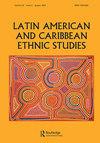Community, dispossession, and ethnic rearticulation in Mexico and Guatemala
IF 1
Q4 ETHNIC STUDIES
引用次数: 1
Abstract
ABSTRACT When neolberalism turned onto extractivism in Latin America, Indigenous populations suffered anonslaught against their territories. In general, resistance mobilization has emerged from community government institutions updated by indigenous peoples who areaware of their rights, and communities are transforming in this process of political action. I propose understand indigenous subjects to be historically active political subjects, and the ‘indigenous community’ as an ethnic construction. Mexico and Guatemala represent an ideal space to study these dynamics, for indigenous communities have characterized much of the social and political behavior of indigenous peoples in these countries, and are now the ones rising up to defend themselves from the dispossession of their territories and ways of life in both countries.墨西哥和危地马拉的社区、剥夺和种族重新融合
当拉丁美洲的新自由主义转向采掘主义时,土著居民遭受了对其领土的攻击。总的来说,抵抗运动是由认识到自己权利的土著人民更新的社区政府机构发起的,社区在这一政治行动过程中正在发生变化。我建议将原住民主体理解为历史上活跃的政治主体,将“原住民社群”理解为一种族群建构。墨西哥和危地马拉是研究这些动态的理想空间,因为土著社区在这些国家的土著人民的社会和政治行为中具有很大的特点,现在他们正在起来保护自己,以免他们的领土和生活方式在这两个国家被剥夺。
本文章由计算机程序翻译,如有差异,请以英文原文为准。
求助全文
约1分钟内获得全文
求助全文
来源期刊

Latin American and Caribbean Ethnic Studies
Social Sciences-Cultural Studies
CiteScore
1.30
自引率
16.70%
发文量
22
 求助内容:
求助内容: 应助结果提醒方式:
应助结果提醒方式:


